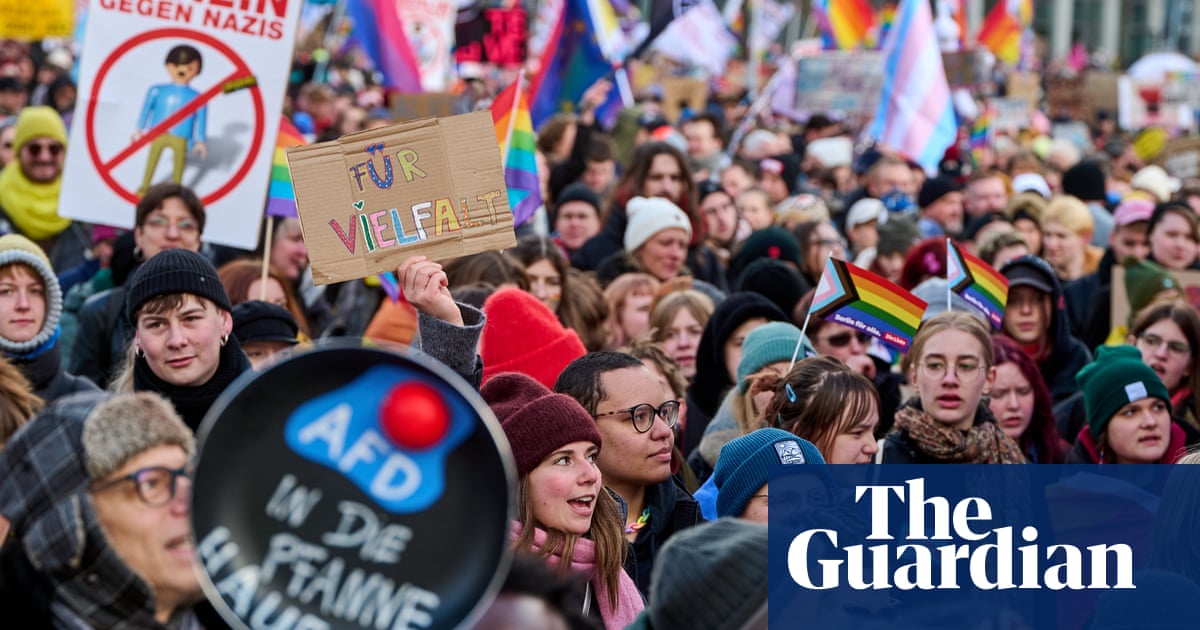They poured on to streets across Germany by the thousands, waving rainbow flags and signs that read “Choose Love”. Days before an election in which the far right is expected to catapult into second place in Germany’s parliament, the simultaneous rallies in 50 municipalities were billed as a show of strength by an LGBTQ+ community as people braced for what might lie ahead.
“Many queer people are unsettled by the social and political situation,” the organisers of the mid-February, cross-country initiative wrote on their website. “The tone against us is getting harsher, and liberal democracy is under pressure.”
For years, rights campaigners have come up against the far-right Alternative für Deutschland (AfD) and its opposition to marriage equality, safe community spaces and access to healthcare and reproductive justice.
Sunday’s election, however, could leave the LGBTQ+ community grappling with an intensified challenge as polls suggest support for the AfD is set to double, yielding a result that would be unprecedented in the country’s postwar history.
Alva Träbert, a board member of Germany’s LGBTQ+ umbrella group LSVD and Federation Queer Diversity, said: “We are looking at political actors openly including anti-queer and anti-trans policy in their campaigns as part of a larger effort to scapegoat marginalised groups for bigger social issues, while simultaneously legitimising discrimination and hate towards them.”
The AfD’s manifesto for the upcoming election defines family as a “father, mother and children”, to the exclusion of all other forms of families. It calls for minors to be protected from what it describes as “the trans cult, early sexualisation and gender ideology”.
In recent years, as support has surged for the far right, the impact has been palpable: campaigners said they were aware of at least 26 attacks by far-right protesters on Pride marches last year. Träbert said in an email: “As heartbreaking and frightening as this development is, it is an unsurprising consequence of the proliferation and normalisation of anti-queer and anti-trans sentiment in politics and the media. We know this from our history: violence begins with words – and words become actions.”
Träbert said that as the community had grappled with fear and uncertainty, it had been met with love and support from some quarters, with people travelling across Germany to attend Pride events in person, and others becoming activists for the first time.
In the lead-up to Sunday’s elections, polls suggest the conservative CDU-CSU bloc could emerge as the most-voted party, with about 28% of the vote, followed by the AfD.
While the conservative opposition leader, Friedrich Merz, has ruled out any formal cooperation with the AfD, he recently leaned on the party to support a non-binding resolution on border policy, marking a historic breach of a taboo.
His willingness to do so added to concerns about the influence of the AfD, said Träbert. “Over the past months, it has been increasingly concerning to see more centrist parties aiming to win back the electorate by appropriating the AfD’s talking points and policies.”
Both Merz’s party and the AfD have vowed to revoke the self-determination law, which took effect last November and made it easier for people to reflect their preferred names and gender on official records. The shared promise posed a “serious threat” to transgender, non-binary and intersex people, Träbert said.
The far right’s consistent efforts to roll back LGBTQ+ rights seemingly contradicts its candidate for chancellor, Alice Weidel, a lesbian woman who is raising two sons with her Sri Lankan-born wife.
“I would say Alice Weidel serves as a kind of fig leaf,” said Constantin Wurthmann, a political scientist at the University of Mannheim. “Because if you say the AfD is racist, you can point to Alice Weidel’s partner who is not white.
after newsletter promotion
“And if you say, well, the AfD is against homosexuals, you can say, well she’s a lesbian candidate and a leading figure. But I would say that while she has this sexual orientation, she doesn’t share the identity of the community at all.”
The AfD did not reply to a request for comment. Speaking to the Financial Times earlier this year, one senior AfD official sought to explain the paradox in this way: “She is just gay by biology, but not by political conviction.”
In recent months Weidel has courted allies known for their strong stance against LGBTQ+ rights, from Elon Musk, who blamed “the woke mind virus” for his transgender daughter Vivian’s transition; to Hungary’s prime minister, Viktor Orbán, who last year was accused of using a “machinery of fear” to attack the LGBTQ+ community.
The apparent contradictions were put to Weidel earlier this month when she visited Budapest to meet Orbán. In an open letter, the Labrisz Lesbian Association, one of the co-founders of the Budapest Pride parade, laid bare what it meant to be LGBTQ+ in Orbán’s Hungary.
The letter said: “Welcome to a country where lesbians cannot participate in artificial insemination programmes, cannot adopt children, and if they already have children, only one of them can exercise parental rights.”
The association contrasted the situation with Orbán’s reception of the AfD. “Orbán and his homophobic comrades, with their political interests in mind, will no doubt discreetly excuse you for being a lesbian. Orbán will certainly not lecture you that you are unfit to bring up children and that you are corrupting your children. And you will discreetly not think of your partner and two children while smiling into the cameras as you shake hands with Orbán.”
The letter finished with a query, echoing the question that had been asked across Hungary, Germany and beyond after the AfD’s announcement of Weidel’s visit to Budapest. “Dear Alice Weidel, what message are you sending to Hungarian lesbians with your visit?”
Article by:Source: Ashifa Kassam in Berlin, and Jakub Krupa
















